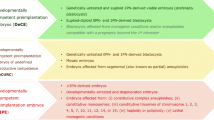Abstract
In 1995 the Ethics Commission of the Medical University of Lübeck was asked to rule on whether a preimplantation diagnostic procedure (PID) could be performed on a husband and wife who were both carriers of the cystic fibrosis mutation Δ F508. The couple had previously given birth to a child with cystic fibrosis and had twice terminated a pregnancy following prenatal screening. Ethically, the performance of a PID was certainly warranted for this couple. The risk of violating §§8 Section 1 and/or 2 Section 1 (“totipotent cells shall not be removed for diagnostic purposes”) of the Law for the Protection of Embryos (ESchG) was judged to be nonexistent in written statements from two expert witnesses (Prof. K.V. Hinrichsen and Prof. H.M. Beier, both embryologists). In the view of the Ethics Commission, only §1 Section 2 (“an ovum shall be fertilized only for the purpose of inducing pregnancy”) of the ESchG currently prohibits PIDs. In light of the social and biological arguments in favor of PIDs, however, the Ethics Commission questioned whether this section of the ESchG is still morally justifiable.
Zusammenfassung
Die Ethik-Kommission (EK) der Medizinischen Universität zu Lübeck (MUL) erhielt 1995 einen Antrag für ein Votum zur Durchführung der Präimplantationsdiagnostik (PID) bei einem Ehepaar mit einem hohen Risiko für eine kindliche Erkrankung an Mucoviszidose (beide Eltern Träger der Mukoviszidosemutation Δ F508). Das Ehepaar hatte bereits ein erkranktes Kind geboren und bereits zweimal war nach einer Pränataldiagnose eine Schwangerschaft unterbrochen worden. Aus ethischer Sicht war bei diesem Ehepaar die Durchführung der PID zweifelsfrei zu befürworten. Die Gefahr der Realisation der §§8 Abs 1 bzw. 2 Abs 1 Embryonenschutzgesetz (Entnahme totipotenter Zellen für diagnostische Zwecke) konnte durch zwei embryologische Gutachten (Prof. K.V. Hinrichsen, Prof. H.M. Beier) als nicht existent ausgeschlossen werden. Nur §1 Abs 2 ESchG (Befruchtung einer Eizelle ausschließlich zum Zwecke der Herbeiführung einer Schwangerschaft) widerspricht nach Meinung der EK der MUL zur Zeit der Durchführung der PID, obgleich Argumente existieren, die sowohl aus systematischer wie auch aus pragmatischer (sozialer wie biologischer) Sicht die Schlußfolgerungen als fragwürdig erscheinen lassen. Die EK der MUL stellte daher die Frage, ob in dieser speziellen Frage das Embryonenschutzgesetz ethisch vertretbar sei.
Similar content being viewed by others
Author information
Authors and Affiliations
Additional information
Eingegangen: 24. September 1998 / Angenommen: 2. Oktober 1998
Rights and permissions
About this article
Cite this article
Oehmichen, M. Präimplantationsdiagnostik: Antrag und Entscheidungsfindung der Ethik-Kommission Lübeck. Rechtsmedizin 9, 107–111 (1999). https://doi.org/10.1007/s001940050091
Issue Date:
DOI: https://doi.org/10.1007/s001940050091




